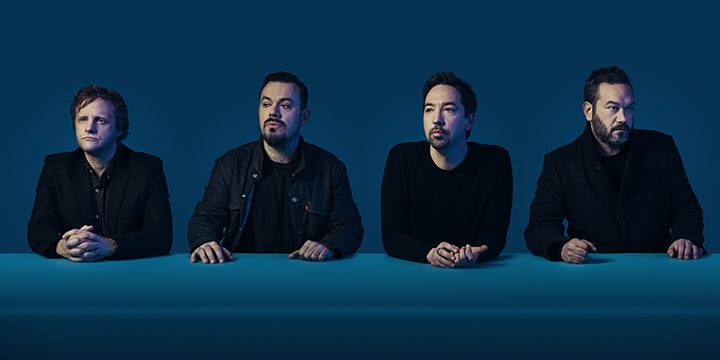This September marks 20 years since the release of Shihad’s eponymous third LP, commonly known as The Fish Album.
To celebrate, the Kiwi hard rockers have remastered and reissued the album on vinyl, and they’re heading out on a national Australian tour. It’d be an exaggeration to say Shihad still sounds brand new, but the production doesn’t seem dated, allowing the songs to continue to speak loudly. The Fish Album was recorded in Auckland with producer Malcolm Welsford, and drummer Tom Larkin casts his mind back to the recording sessions.
“The band was in a real state of flux. I think that’s what you get with that album,” Larkin says. “In terms of the people in Shihad, we were an inner-city band and we came from the metal scene. And once we toured Europe and we were paired with a lot of metal festivals and metal bands, we found ourselves not enjoying our environment on a musical level. With some notable exceptions, we didn’t feel a strong kinship with a lot of the bands that were going around at the time. That meant that our music reflected a want to escape that tonality and that slant on things.”
In contrast to Shihad’s first two records – Churn (1993) and Killjoy (1995) – Shihad is more melodic and more concerned with the art of storytelling. There were manifold reasons for this shift, but Larkin notes one unexpected influence.
“I remember Oasis were really huge at the time and it had blown open the doors in the UK,” he says. “And we were very impressed having seen them live, when they were just breaking, in Denmark. That affected the songwriting team and the songs started to be much more melodic and not necessarily along the lines of the heavier stuff that we were known for.
“That placed the band in an unusual situation whereby half of the band were like, ‘We need to continue the narrative we’ve set up and the style. I still enjoy heavier stuff.’ And the other half were pulling away from that, wanting to explore more pop music, more colourful stuff.”
Shihad’s creative division was understandable considering Killjoy had put them under the spotlight and made a mark outside their native New Zealand. Meanwhile, their creative resolution became even more muddled when tragedy struck.
“We’d just had the death of our initial manager [Gerald Dwyer, who died in early 1996] and then we were thrown into the recording studio within a couple of months after that,” Larkin says. “We lost our balance, so to speak. From our artistic end we all had thoughts on how we should do it. Instead of having someone to tether it and [tell us] where to go, we threw ourselves in the studio. Also our producer, his father had died before we went in. Everyone making the album was really confused.”
Given there was no clear direction at the outset of the Shihad sessions, the album’s personality only became apparent during the recording process.
“It’s a bit of a patchwork quilt,” Larkin says. “There’s a couple of things that really come into focus – to this day, one of our biggest songs, kind of our calling card, is the song ‘Home Again’. We explored song stuff that we’d never explored before. So there’s songs like ‘La La Land’, which is a really great lyrical narrative about living in LA. ‘Home Again’ [is also] about living in LA and missing home. You’re seeing the songwriting side of things really get some focus and attention and actually developing really strongly, particularly on a lyrical level, and moving into themes and stories about life as it happens to us.”
There are, however, some Shihad songs that illuminate the band’s confusion around that time. “You had other tracks which were much less focused and really out of kilter, particularly considering where we’d come from on a musical level,” says Larkin. “I think that a lot of fans perceived that the band had come off the boil on an impact level. That’s certainly a fair assessment. A mistake we’ll never make again is having a pot budget, because we literally had a bowl in the control room. Making high-energy rock while stoned actually doesn’t work. It has peaks and troughs, and that’s the beauty of it.”
The Fish Album is distinguished from Shihad’s two subsequent records – The General Electric (1999) and Pacifier (2002; made during the short-lived stint when they went by the name Pacifier) – which were enhanced by a major label budget and have a bigger, slicker commercial rock sound. By contrast, the self-titled album still possesses an appealing rawness.
“Even in comparison to our first two, [Shihad] was underproduced,” says Larkin. “At times that worked and at times that didn’t, but it will always retain a charm. There’s tracks I hear now and I go, ‘Wow, that’s actually unique. We’ll never sound like that again.’ The whole album was a confused band with no clear agenda and the album’s strengths and weaknesses reside off that fact.
“That process, when you look at it now, was tremendously useful for the long-term career of the band. The General Electric had searing focus as to delivery. It wouldn’t have come together the way it did without the inspiration we undertook on The Fish Album.”
Shihad perform at PigSty In July 2016,Dashville, Lower Belford, onSaturday July 2, with King Tide, Sea Legs, Lepers & Crooks, Claire Anne Taylor and more; then the Factory Theatre on Friday July 15.


































